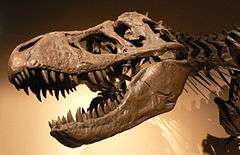1905 in paleontology
| |||
|---|---|---|---|
Paleontology or palaeontology (from Greek: paleo, "ancient"; ontos, "being"; and logos, "knowledge") is the study of prehistoric life forms on Earth through the examination of plant and animal fossils.[1] This includes the study of body fossils, tracks (ichnites), burrows, cast-off parts, fossilised feces (coprolites), palynomorphs and chemical residues. Because humans have encountered fossils for millennia, paleontology has a long history both before and after becoming formalized as a science. This article records significant discoveries and events related to paleontology that occurred or were published in the year 1905.
Archosauromorphs
Newly named dinosaurs
Data courtesy of George Olshevsky's dinosaur genera list.[2]
| Name | Status | Authors | Age | Unit | Location | Notes | Images | |
|---|---|---|---|---|---|---|---|---|
|
Valid taxon |
Late Cretaceous (Edmontonian) |
| ||||||
| "Diceratops"[4] |
Preoccupied. |
Lull vide:
|
Late Cretaceous (Lancian) |
Has been considered a member of Triceratops, but recent work has indicated it deserved its own genus after all. In 2008 it was renamed Diceratus because Diceratops was preoccupied by a hymenopteran insect Foerster, 1868. | ||||
|
Late Cretaceous (Lancian) |
Same as Tyrannosaurus, this name was rejected because Tyrannosaurus was mentioned earlier in the paper. | |||||||
| Stegopelta[5] |
Valid taxon |
|
Middle Cretaceous (Cenomanian) |
A nodosaurid. | ||||
| Tyrannosaurus[3] |
Valid taxon |
Late Cretaceous (Lancian) |
Lance Formation |
Tyrannosaurus is the largest recognized tyrannosauroid and one of the most famous dinosaurs. | ||||
Other archosauromorphs
| Name | Status | Authors | Age | Unit | Location | Notes | Images | |
|---|---|---|---|---|---|---|---|---|
|
Preoccupied. |
|
Late Cretaceous (Turonian) |
Jizera Formation |
Preoccupied by Procerosaurus von Huene, 1902; later renamed Ponerosteus Olshevsky, 2000. Either a bird or pterosaur.[6] |
||||
Synapsids
Non-mammalian
| Name | Status | Authors | Age | Unit | Location | Notes | Images |
|---|---|---|---|---|---|---|---|
|
Broom |
Middle Permian |
A member of Dinocephalia. |
| ||||
|
Broom |
Burgersdorp Formation |
Junior synonym of Microgomphodon. | |||||
|
junior synonym |
Broom |
Burgersdorp Formation |
Junior synonym of Microgomphodon. | ||||
Other reptiles
| Name | Status | Authors | Age | Unit | Location | Notes | Images | |
|---|---|---|---|---|---|---|---|---|
| Albisaurus[7] |
|
Late Cretaceous (Turonian) |
Jizera Formation |
May have been a misidentified marine reptile. |
||||
References
- ↑ Gini-Newman, Garfield; Graham, Elizabeth (2001). Echoes from the past: world history to the 16th century. Toronto: McGraw-Hill Ryerson Ltd. ISBN 9780070887398. OCLC 46769716.
- ↑ Olshevsky, George. "Dinogeorge's Dinosaur Genera List". Retrieved 2008-08-07.
- 1 2 3 Osborn, H.F. 1905. Tyrannosaurus and other Cretaceous carnovorous dinosaurs. Bull. Amer. Mus. Nat. Hist. 21: pp. 259-265.
- ↑ Hatcher, J.B. 1905. Two new Ceratopsia from the Laramie of Converse County, Wyoming. Amer. J. Sci. (ser. 4) 20: pp. 413-419. vide Lull, R.S. 1905. Restoration of the horned dinosaur Diceratops. Amer. J. Sci. (ser. 4) 20: pp. 420-422.
- ↑ Williston, S.W. 1905. A new armored dinosaur from the Upper Cretaceous of Wyoming. Science 22 (564): pp. 503-504.
- ↑ Fejfar, O., Košťák, M., Kvaček, J., Mazuch, M., and Moučka, M. 2005. First Cenomanian dinosaur from Central Europe (Czech Republic). Acta Palaeontologica Polonica 50 (2): 295–300.
- ↑ Fritsch, A. 1905. Synopsis der Saurier der Bohmischen Kreideformation. Sitz. Konig. Bohm. Ges. Wiss., II. Classe. (7 pages)

